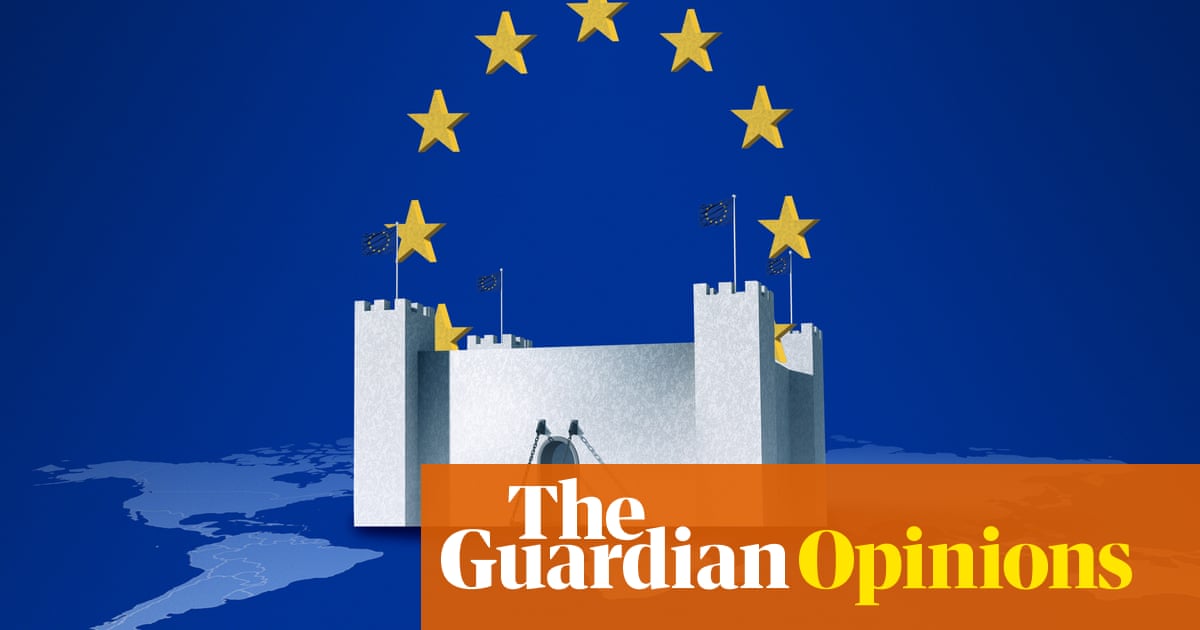Donald Trump has disrupted the global economy with his disastrous tariff wars and appears hell-bent on gutting transatlantic relations. I am hoping he has also unwittingly injected new life into the EU’s struggle to wean itself off overreliance on Washington.
A vast network oftradeandaidagreements connects the EU with more than 70 countries. The union could become an important standalone global actor and even thrive in a multipolar world. But it must first shed its Eurocentric worldviews, complacent policymaking anddouble standards.
The omens are mixed. Ursula von der Leyen, the president of the European Commission, hasannounced plansto build a “new EU” that can actively shape a different world order. She hasacknowledgedthat the “west as we knew it no longer exists”, and so the EU must get used to a more complex global system.
The French president, Emmanuel Macron, advocates for European “strategic autonomy”, and Germany’s new chancellor, Friedrich Merz, although a staunch Atlanticist, says Europe must regain itsindependence from the US. Amid geopolitical chaos, it is good news that there is an increase inpublic supportfor the EU and that many in the global southsee the blocas an important geopolitical actor.
But some countries, such as Italy, Hungary, Poland and the three Baltic states, still hanker for life under US protection. Moreover, Brussels has yet to disprove acomplaintabout the EU’s mindset by the Indian foreign minister, Subrahmanyam Jaishankar. After Russia’s 2022 invasion of Ukraine, he said Europe thinks “its problems are the world’s problems, but the world’s problems are not Europe’s problems”.
Many in the global southare outraged, for instance, at the EU’s failure to condemn Israel’sgenocide in Gazaeven as it talks up its commitment to human rights in Ukraine. As the South Africa-based academicCarlos Lopes, author of a recent book on EU-Africa relations, told me, the EU retains such a deep-rooted “colonial attitude of superiority that it translates into a sort of patronising charity and altruism”.
Yet the EU remains attached to global trade rules, has an economy that is postingmodest growthand an attractive and vibrant single internal market. The time is right for an upgrade in EU relations with the global south, but the old rules of engagement need an urgent overhaul.
Von der Leyen claims the world is “lining up” to find safe business opportunities with a Europe that upholds the rule of law as Trump sows chaos on global markets. But having reported on EU relations with the global south for most of my professional life, it is clear to me that EU policymakers must stop lecturing and start listening. In addition to protecting trade, the EU has a once-in-a-lifetime opportunity to re-evaluate its soft-power credentials, which are now tarnished byracism, Islamophobia, antisemitism and attacks on women’s rights and the gay community.
After years of negotiations, prospects for new EU free-trade agreements with Indonesia, Malaysia, Thailand and India appear upbeat. But only if European negotiators heed figures such as the former Indonesian president Joko Widodo when theystand up againstperceived EU coercion and an assumption in Brussels that “my standards are better than yours”. The EU, for instance, has clinched or is pursuing criticalraw-material dealswith resource-rich countries such as Rwanda, Namibia and the Democratic Republic of the Congo. Europe needs to protect its green and digital transition, but these deals risk turning into little more than neocolonial resource grabs: no wonder Indonesia and some African countries arepushing back.
Since Trumpdismantled USAid, European activists are also fighting to maintain EU funding for the world’s most fragile nations. But what hope is there when EU governments, including France and Germany, areslashingtheir development budgets.
As efforts continue to limit migration to Fortress Europe in all itsharsh manifestations, the EU’s strategy of relying on neighbouring strongmen who are paid to deter migrant crossings is provoking seriousracial strife. Yasmine Karimi, an expert in Europe-north Africa relations, tells me:“The Tunisian president hasaccused African migrantsof being part of a scheme to change the demographic composition of Tunisia. It is a ‘great replacement’ argument that has never before been heard in north Africa.”
Sign up toHeadlines Europe
A digest of the morning's main headlines from the Europe edition emailed direct to you every week day
after newsletter promotion
The EU could also show more grit as Trump takes a sledgehammer to diversity, equity and inclusion initiatives. But while Hadja Lahbib, the EU’s equality commissioner, is seeking to strengthen women’s rights, no action has been taken so far to revive an important antidiscrimination law that wasabruptly withdrawnearlier this year. The EU’s moral authority has been undermined by Germany and other statescracking downon pro-Palestine protesters.
In many ways, Trump provides European policymakers with an opportunity. They have a chance now to revise some of the EU’s more egregious policies and to truly reinvent the bloc as a credible, relevant presence on the global stage.
I am confident that stronger EU engagement with the global south could help bring geopolitical stability to an unsettled world. It would also offer a compelling alternative to Trump’s dystopia. But it will require more than von der Leyen’s rhetoric and wishful thinking.
Shada Islam is a Brussels-based commentator on EU affairs. She runs New Horizons Project, a strategy, analysis and advisory company
